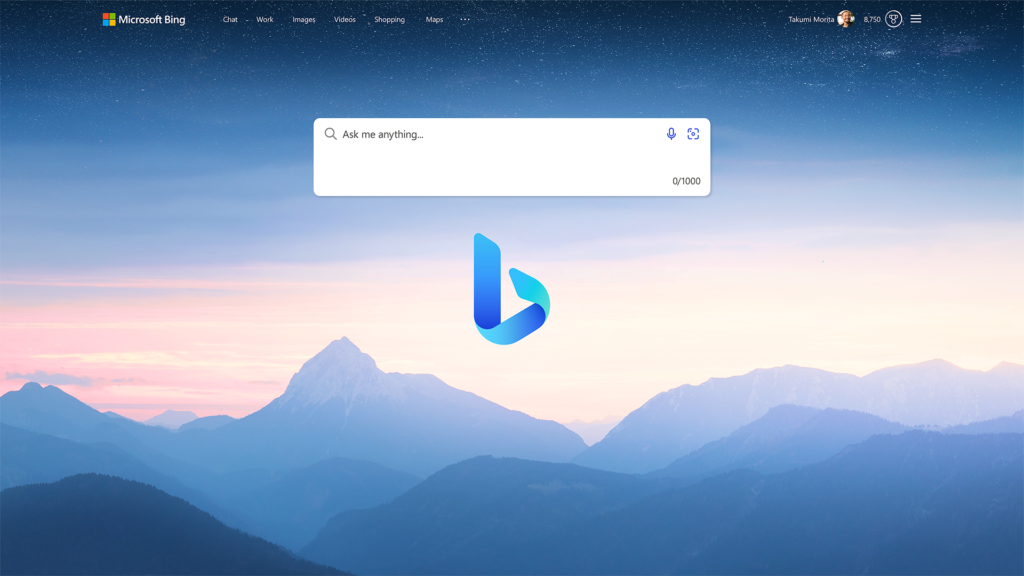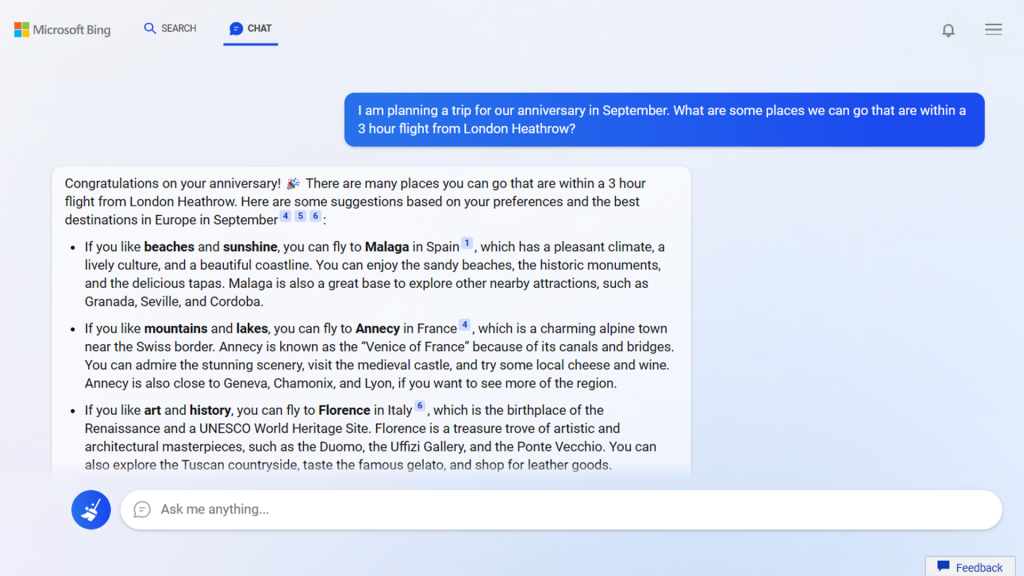Before we begin, I much check that you are holding your cup of tea with both hands. If not, please ensure you do before continuing, for my sake if not yours. However many hands you have clasping your tea right now, I need you to brace yourself because we’re about to embark on a whirlwind journey into the heart of artificial intelligence (AI) that’s revolutionizing the way we interact with the digital world.
Today, our tech spotlight falls on Bing AI, a trailblazing product of Microsoft’s genius that’s shaking the foundation of the search engine industry (and yes, I never thought I would write this sentence about Bing in my lifetime, but here we are). So, if you’ve been wondering what the future holds for search, it’s time to put on your explorer’s hat and join me in unraveling the complexities and the opportunities that Bing AI presents. Just before we set sail, let’s take a moment to understand the significance of this technological evolution.

For years, search engines have served as our gateway to the internet, helping us navigate the vast sea of online content. They’ve evolved from simple keyword matchers to semantic understanding, but even then, there was always something missing – an ability to make search a conversation rather than a command. Enter Bing AI: a technological marvel that’s all set to make search more personalized, accurate, and interactive than ever before. So, buckle up and get ready for a deep dive into this exciting new world.
Mechanics of the Future: How Bing AI Works
After literally years of being Google’s deeply emaciated 4th cousin (twice removed), Bing has been hitting the gym, drinking its protein shakes, and is looking good. Seriously good. Microsoft has just launched an all-new, AI-powered Bing search engine which they have deeply integrated into Edge browser, that they’re billing as an AI co-pilot for the web. I mean, who wouldn’t want their own digital wingperson? But what does that actually mean for us users?

Microsoft is essentially blending search, browsing, and chat into one streamlined experience. That’s like the tech equivalent of mixing chocolate, vanilla, and strawberry into a Neapolitan ice cream of interactivity (delish – the only thing missing is a muffin). It’s supposed to give you more relevant search results, complete answers to your queries, a new chat experience, and even help generate content. Need to draft an email or plan a trip to Tasmania (sure, you do!)? Bing’s got your back. And it’s not just providing answers—it’s handing out inspiration like mugs of tea at 87th birthday party (or a regular Tuesday for me).
They’ve also spruced up the Edge browser with new AI capabilities and a fresh look. It’s got this new Edge Sidebar feature that lets you ask for a summary of a lengthy financial report or help composing a LinkedIn post. It’s like having your own personal assistant right there in your browser, ready to help you get the job done. And the best part? It adapts to the web page you’re on, so it knows exactly what you’re dealing with.
The new Bing is running on a next-gen OpenAI model that’s more powerful than ChatGPT and has been custom-tailored for search. It’s like they took the brain of the Terminator and fused it with the knowledge of Wikipedia. And Microsoft has developed a proprietary way of working with the OpenAI model that they’re calling the Prometheus model. This combo promises more relevant, timely, and targeted results. Plus, they’ve applied AI to the core Bing search algorithm, leading to the biggest jump in relevance in two decades. I almost have no shame in saying that I am considering the switch form Google to Bing (but don’t tell anyone just yet).
Now, I know what you’re thinking: “what about the risks of AI?”. Well, Microsoft and OpenAI have got that covered too. They’re working hard to tackle issues like misinformation, content blocking, and data safety. They’re putting a lot of effort into ensuring that their AI systems are responsible by design, and they’re developing new ways to mitigate risk.
But I know you’re itching to test it out. Good news! The new Bing is available in a limited preview on desktop, and they’re going to scale it to millions in the coming weeks. And yes, a mobile experience is also on the way. So, head over to Bing.com and get yourself on that waitlist. Who knows? You might just find your new favorite search engine.
Google: Second Place?
First off, we need to acknowledge that this is a huge move by Microsoft. I mean, Bing has always been the butt of the joke when it comes to search engines, hasn’t it? But it looks like Microsoft is having the last laugh here with this AI-powered Bing and Edge. They’re not just giving us another search engine, they’re redefining what a search engine can be. And this isn’t some half-baked promise, to be sure. The features they’ve rolled out are game-changing, from the interactive chat to the content generation, and they’ve already got over 100 million daily users to show for it.
Now, let’s talk about Google. They’ve been sitting pretty at the top of the search engine game for years. But with this new move from Microsoft, they might finally have a real competitor on their hands. Google’s search engine, while incredibly powerful, is mostly a traditional search engine. You input a query, and it spits back a list of results. Bing, on the other hand, is evolving into something more like an interactive assistant, one that can chat with you, generate content, and even help you write an email or plan a trip. It’s not hard to see how this could appeal to a lot of users.
So how should Google respond? Well, first, they need to take this threat seriously. Bing is no longer the underdog, and if Google doesn’t step up, they could find themselves losing ground. That means investing in their own AI and machine learning capabilities to match or even surpass what Bing is offering. Google has the resources and the talent to do this, but it will require a significant shift in focus and strategy.
Second, Google needs to ensure they’re meeting users where they are. Bing’s new chat feature, for example, is a direct response to the way people are using the internet today – for collaboration, communication, and real-time assistance. If Google wants to keep pace, they’ll need to consider integrating similar features into their own platform. They’ve already got a leg up with Google Assistant, but they need to make sure they’re not being left behind as the search game evolves.
Google also needs to double down on their strengths. They’ve built a massive ecosystem that includes not just search, but also email, productivity apps, cloud storage, and more. They should leverage these synergies to create a more cohesive, integrated experience for their users. If they can offer a suite of interconnected services that all work seamlessly together, that could be a huge advantage.
Finally, and perhaps most importantly, Google needs to make sure they’re listening to their users. At the end of the day, the success of any platform depends on its ability to meet the needs of its users. If users are responding positively to Bing’s new features, Google should take that as a signal that they need to innovate and adapt. After all, in the tech world, complacency is the fastest route to obsolescence. Google has a history of innovation and has been the leader in the search engine space for years. Now, they need to show they can continue to lead in the face of new competition.
What This Means SEO and Content
Now, we’ve talked about what Microsoft’s new Bing AI means for search, what it means for Google, but what does it mean for the real workhorses of the internet, the SEO specialists and content creators out there?
First things first, this is big news for anyone in the SEO world. Bing’s AI-powered search engine and Edge browser are designed to deliver better search, more complete answers, and understand and summaries content that you are looking at. It’s clear that Microsoft is rethinking how we interact with search and the web in general, and that means SEO strategies are going to need to evolve too. It’s no longer just about optimizing for keywords and backlinks. It’s about providing comprehensive, high-quality content that Bing’s AI can understand and use to answer user queries.

It also features a chat experience that refines your search until you get the complete answer you’re looking for. This means there’s now an even greater emphasis on creating high-quality, informative content. Think about it: if Bing’s AI is using your content to answer user queries directly in the chat, that’s a massive opportunity for visibility and engagement. You need to be creating content that is so good, so useful, that Bing’s AI wants to use it to answer user queries.
What’s more, Bing’s new AI capabilities mean that we might start seeing a shift in how search results are presented. It’s not just about ranking on the first page anymore. Now, your content could be pulled into a chat, summarized in a sidebar, or even used to generate new content. This opens up a world of possibilities for how users interact with your content, and it means content creators need to think more creatively about how they format and present their information.
And now, for the flip side of the coin. With every shiny new tool, comes a new set of challenges to wrestle with. So, buckle up and let’s jump into the potential hurdles that this Bing AI update might throw at the SEO specialists and web publishers.
The first obstacle in the track is the learning curve. This AI integration is changing the game. We’re talking a whole new rulebook. It’s not just about mastering keywords, meta tags, and backlinks anymore. SEO specialists and web publishers will need to understand how this AI works, how it processes and generates content, and most importantly, how to optimize their content so that the AI picks it up. It’s like learning a new language mid-sentence. Sounds like fun, right?

Bing’s new chat experience might be a game-changer for user interaction, but it also means that content will need to be more detailed, more engaging and more accurate than ever before. We’re not just talking about quality here, we’re talking about being the best answer to a user’s query. And let’s be real, when you’re competing with an AI that’s been trained on vast amounts of data, that’s going to be a tough act to follow.
Thirdly, Bing’s AI isn’t just about providing answers, it’s also about generating content. So, web publishers aren’t just competing with other publishers for visibility anymore, they’re also competing with AI-generated content. We’re entering a world where the machine is not just a tool, but a rival. This is going to push publishers to up their game, to create content that’s not just good, but exceptional.
Finally, there’s the issue of traffic. Bing’s AI is designed to provide comprehensive answers directly in the search results. This means that users might get the information they need without ever clicking through to a website. For web publishers who rely on ad revenue, this could potentially be a major problem. They’re going to need to think creatively about how to drive users to their site, even when Bing’s AI is providing answers directly in the search results.
Final Thoughts
We’ve been on quite a rollercoaster ride today, haven’t we? From the shiny new features of Bing’s AI-enhanced search, to the potential challenges for the SEO and web publishing community, it’s clear that this isn’t just a small update. This is a game-changer. A shake-up of the online landscape as we know it.
And let’s not forget about Google in all of this. They’re not just going to sit back and watch Bing have all the fun. No, they’re going to come back swinging. I’m sure we’ll see some exciting developments from their end as well, and I, for one, can’t wait to see what they come up with.
As for the web publishers out there, I know this might seem like a daunting challenge. It’s like Bing’s AI has just raised the bar and then catapulted it into space. But remember, you’re not alone in this. This is a challenge for the entire community, and it’s an opportunity to push the boundaries of what’s possible in content creation and SEO.
And to the SEO specialists, time to roll up your sleeves and get to work. There’s a new player in town, and it’s time to figure out how to make it work for you. Remember, every challenge is just an opportunity in disguise. The world of search is changing, and it’s changing fast. Stay tuned for more updates, and until next time, keep pushing those boundaries!

